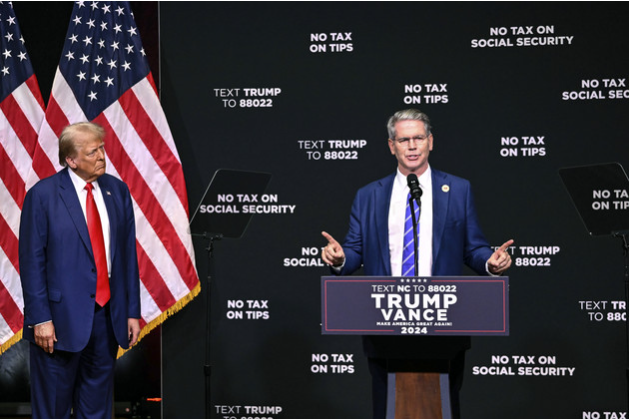News
The man who will have to make Trump’s sweeping economic program work

Hedge fund executive Bessent will be Trump’s primary conduit to Wall Street investors who are skeptical of the president-elect’s punishing trade agenda.
If you felt a gust of wind from out of the Northeast, it was the collective sigh of relief coming from New York’s financial district over Donald Trump’s selection of Scott Bessent to lead Treasury.
After a series of unorthodox Cabinet picks that shocked the policy world, Trump’s choice of the 62-year-old hedge fund executive is being praised by Wall Street heavyweights who had hoped the president-elect would select a more traditional candidate for his administration’s most powerful economic post. While Bessent — once the chief investor at financier George Soros’ firm — has been a vocal proponent of Trump’s agenda, he’s also viewed as a realist who will understand how policy shifts might ripple across markets and the global economy.
“The biggest risk is that you have ideologues pursuing policy regardless of consequence,” said Unlimited Funds CEO Bob Elliott. “The thing about a person who has run money for several decades is that they — almost by definition — have to be agile and responsive to market conditions. It’s in their blood.”
To be certain, Bessent — who had flown under the radar of many policymakers prior to this election campaign — will face steep challenges if confirmed. Trump has promised to simultaneously cut taxes, impose universal tariffs and unlock economic growth by boosting domestic energy production and slashing regulations. Corporate America likes a lot of that message — in theory — but reshaping the economy to Trump’s specifications could also disrupt supply chains, drive up prices and send interest rates even higher.
And it will be up to Bessent — who has no government experience — to sell markets, global leaders and the public on how it will all work.
Prior to being selected for Treasury, Bessent was one of Trump’s top behind-the-scenes advisers during the campaign. In his new post he’ll be responsible for a department whose vast jurisdiction includes overseeing the financial markets, the issuance of U.S. debt, economic national security matters, tax policy and the strength of the dollar. (His hedge fund, Key Square Group, manages about $580 million of assets and has only a handful of employees, according to regulatory filings.)
Bessent’s selection followed a weekslong process that people close to the transition have compared to “The Hunger Games” or the CBS reality contest “Survivor” (a program that shares creative DNA with Trump’s own former show, “The Apprentice,” in the form of producer Mark Burnett). As contenders circulated through Mar-a-Lago for interviews with Trump and his advisers, rumors swirled about new alliances, whose stock was climbing, and how each candidate might adhere to Trump’s sprawling economic policy vision.
The two-week fight over who would get the nod underscored the challenges Bessent will face if confirmed by the Senate next year.
Trump says he wants to generate “trillions” in revenue from new tariffs and to have “a say” in Federal Reserve interest rate decisions. He also wants to keep the stock market humming, crush inflation and impose massive cuts to both the budget and the federal workforce. Inevitably, his Treasury secretary will have to shoulder the conflicts and contradictions that arise from that agenda.
What’s more, Bessent will be competing for Trump’s attention at a White House that’s likely to be filled with economic policy advisers who hold starkly different views on trade, tax or fiscal policy. Trump’s transition co-chair Howard Lutnick — who the president-elect slotted to lead the Commerce Department — campaigned hard for the Treasury role and had the backing of Elon Musk, who’s now among Trump’s most vocal advisers. Musk posted on X that Bessent would be a “business-as-usual choice.”
Bessent’s candidacy was also opposed by protectionist trade policy advocates who contended he wasn’t an aggressive enough adherent of Trump’s plan to impose universal tariffs. In a recent appearance on CNBC, Bessent said he would recommend that any new tariffs be “layered in gradually” to spread out their impact on prices, an approach that Trump himself has not publicly suggested. (Bessent also defended the use of tariffs in an op-ed on Fox News as the scramble over who would get Treasury intensified.)
But Wall Street’s comfort with Bessent stands in contrast to how industry reacted to Trump’s controversial selection of former Florida Rep. Matt Gaetz for attorney general until he withdrew or to former Rep. Tulsi Gabbard for Director of National Intelligence. One senior official in a previous administration described Bessent as “being in a different league” than some of other Trump picks, adding that “he’s a respected figure in the macro hedge fund community who has been a successful financial operator.”
“I’ve known Scott for almost 40 years, as he was my first professional hire at Chanos & Co.,” Jim Chanos, the famed short-seller, told POLITICO last week. “While we might disagree on politics, there is no questioning his character, patriotism and intellect. He would make an outstanding Treasury secretary.”
Still, Bessent remains something of an unknown to many in public policy circles, and his leadership and political skills would be severely tested since he’d be spearheading major battles next year over the fate of Trump’s tax cuts, the debt ceiling and potentially massive spending plans. So far, his financial industry credentials aren’t earning him any praise on the left.
“Wall Street may be breathing a sigh of relief at Scott Bessent’s nomination, but working people see no help coming their way,” Sen. Elizabeth Warren said in a statement. “Mr. Bessent’s expertise is helping rich investors make more money, not cutting costs for families squeezed by corporate profiteering.”




